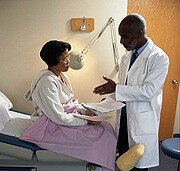
TUESDAY, Aug. 3 (HealthDay News) — Foreign-born doctors practicing in the United States who earned their medical degrees abroad performed as well or better than their U.S.-born counterparts, a new study finds.
Researchers analyzed records on nearly 250,000 patients hospitalized for a heart attack or congestive heart failure in Pennsylvania in 2003-2006. The study included more than 6,100 doctors, including about 4,600 U.S. medical school graduates and 1,500 international medical school graduates. The overall death rate was 5.4 percent.
Patients of foreign-born doctors trained in overseas medical schools had a 9 percent lower death rate than the patients of U.S. citizens trained at U.S. schools. The comparison was more marked with U.S.-born doctors who trained overseas; their patients had a higher risk of dying than patients in either of the other two groups, the study found.
Compared to U.S. citizens who sought their medical degrees in international schools, patients of foreign-born, foreign-trained doctors had a 15 percent lower risk of dying.
“I am reassured that the international medical graduates performed as well as U.S. medical graduates. As a patient I take comfort in that,” said study author John Norcini, president and CEO of the Foundation for Advancement of International Medical Education and Research in Philadelphia. “But it also raises questions about the education of U.S. citizens who go abroad for medical school.”
U.S. citizens who want to become doctors but who were not admitted to a U.S. medical school sometimes seek a medical degree abroad, Norcini said.
The study is published in the August issue of Health Affairs.
About one in four doctors practicing in the United States received their medical diploma abroad, according to background information in the study.
Over the years, some U.S. medical professionals have raised concerns about the quality of medical education in other countries and the ability of an internationally trained doctor to pass licensing exams, Norcini said. More recent studies have shown those fears seem to be unfounded, with doctors trained in international medical schools passing the exams with as much success as U.S.-trained doctors, Norcini noted.
Doctors trained abroad who want to practice medicine in the United States have to undergo a rigorous screening and training process, including passing all of the same exams and meeting all of the requirements as those who get their degrees in this country. That includes completing their residency at a U.S. hospital.
While doctors in the study had medical degrees from dozens of countries, many had diplomas from medical schools in South Asia, especially India and Pakistan.
Dr. Ajeet Singhvi, president of the American Association of Physicians of Indian Origin, said the study offers proof of the quality of doctors trained overseas.
“I am delighted the study has vindicated the quality of care provided by international medical graduates,” Singhvi said. “We have been saying it all along.”
Many graduates of medical schools in other countries had to overcome substantial barriers to getting their education, and have learned how to make do with less, Singhvi said.
“To talk about the quality of care of international medical grads is moot. What they go through is exactly the same training at the same hospitals for the same number of years and [they] take the same exams,” Singhvi said. “On top of that, most of those who come from foreign countries have already learned so much and seen so much from their practical experience.”
Singhvi, a gastroenterologist at Loma Linda University Medical Center in Loma Linda, Calif., has been practicing in the United States since 1977. His son and daughter are now doctors who trained in the United States.
Rather than be concerned where a doctor received his or her medical degree, a better indicator of a doctor’s expertise is board certification; specialty board certification was associated with lower mortality and shorter hospital stays, the study found.
According to the report, the mortality rates for patients climbed along with the number of years since graduation from medical school. Norcini recommends patients ask their doctors if they have kept board certification current.
“We know from this study it doesn’t really matter whether a doctor is an international medical school graduate or a U.S. graduate, but board certification does tell you something,” Norcini said.
More information
For more information on the medical education system in the United States, go to the American Medical Association.

